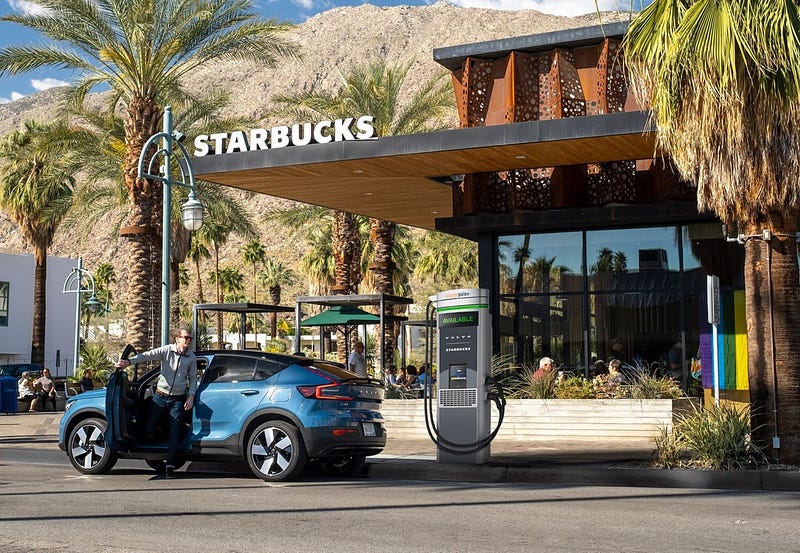Starbucks and Volvo: Pioneering the Future of EV Charging
Written on
Chapter 1: The Innovative Partnership
Starbucks is joining forces with Volvo to establish electric vehicle (EV) charging stations at select Starbucks locations. This initiative will span a 1,350-mile corridor stretching from Denver to Seattle and will involve the installation of 60 branded ChargePoint DC fast chargers across 15 Starbucks locations, spaced approximately 100 miles apart. The installation is set to begin this summer and aims for completion by the end of 2022.
Michael Kobori, Chief Sustainability Officer at Starbucks, highlights the significance of this initiative, stating, "It’s one of those charging deserts, so to speak." The process of charging an electric vehicle is notably different from traditional fuel refilling; it typically requires several hours rather than minutes. Many EV owners depend on home charging solutions and often express concerns about the availability of charging stations during lengthy travels. However, this new collaboration promises to make their journeys more enjoyable.
Section 1.1: The Route and Chargers
Volvo plans to deploy various fast chargers from ChargePoint, including their Express Plus model, which can charge a Volvo C40 Recharge from 20% to 90% in approximately 40 minutes—perfectly aligning with a coffee break.

Section 1.2: Benefits for Volvo Owners
Volvo EV owners will enjoy complimentary charging services, at least initially. The companies will closely observe the usage patterns of these chargers, as the future expansion of this project will depend on the success of this pilot initiative and the demand for these charging facilities.
Chapter 2: The Growing Demand for EV Charging
The collaboration between Starbucks and Volvo is timely, especially considering the rising demand for electric vehicle chargers. According to research by Bauer et al., 2021, the United States is projected to have 26 million electric vehicles by 2030—an increase of over 14 times from the 1.8 million EVs in 2020. This surge in EV ownership will necessitate a tenfold increase in the availability of public and workplace chargers, reaching a total of 2.4 million by 2030.
By 2030, both companies aspire to be leaders in their respective fields: Starbucks aims to set the standard for decarbonization solutions and EV charging accessibility in retail, while Volvo seeks to establish itself as a premier manufacturer of fully electric vehicles.